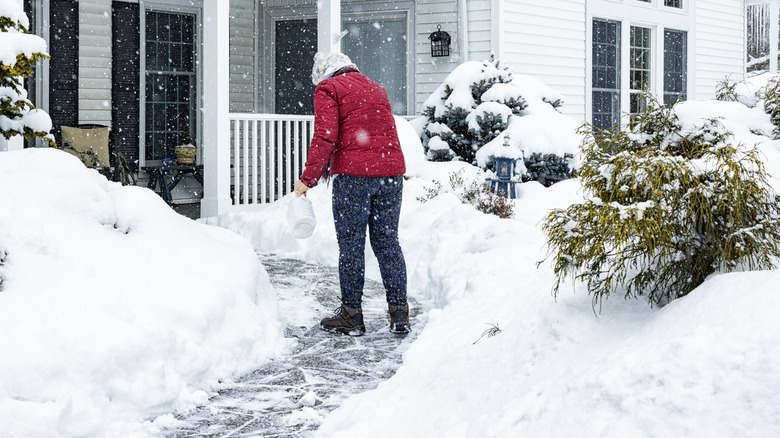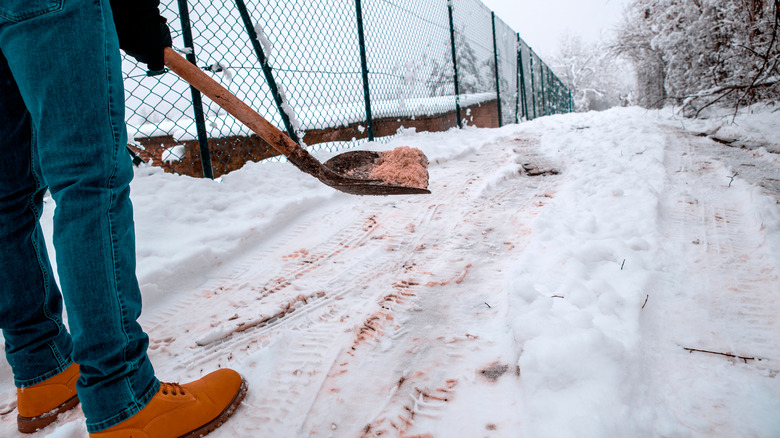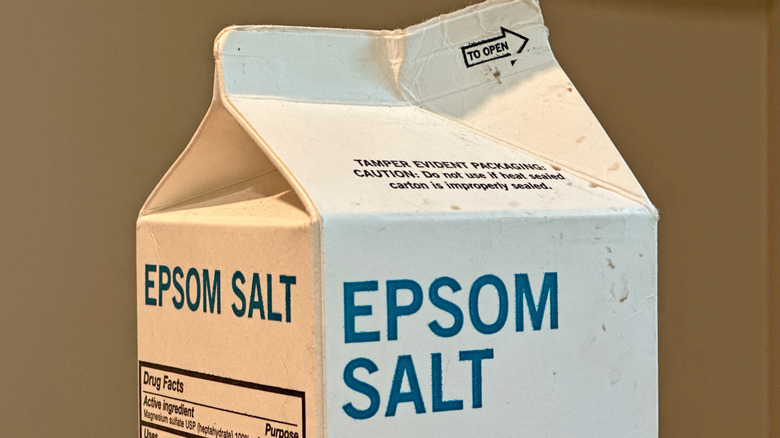The De-Icer Alternative That Won't Harm Your Lawn (And You Likely Already Own It)
De-icers are typically made from various chemical compounds such as sodium chloride, calcium chloride, magnesium chloride, and potassium chloride. These compounds are effective in melting ice and snow by lowering the freezing point of water. However, they can have negative impacts on lawns and yards. One of the main drawbacks of using de-icers is their potential to damage plants and grass. The high salt content in de-icers can cause dehydration and root damage to plants, like abutting lawns or gardens, leading to browning, wilting, and even death. Additionally, when de-icers are applied excessively or improperly, they can accumulate in the soil, altering its composition and making it less suitable for plant growth. Furthermore, the Environmental Protection Agency warns that de-icers can also have environmental consequences. When they are washed away by melting snow or rain, the runoff can find its way into nearby water bodies. Nevertheless, there is an alternative you likely already have at home that has fewer negative effects on the environment and your lawn with some possible advantages: Epsom salt.
Canada Salt claims Epsom salt is a good alternative to rock salt for use on driveways and walkways because it has fewer negative effects on the environment and your lawn. Unlike rock salt, made from sodium chloride, Epsom salt is made up of magnesium sulfate. This means that it is less likely to cause dehydration and root damage to plants, leading to browning and wilting. Additionally, Epsom salt can provide some benefits to your lawn.
Epsom salt may benefit your lawn
Using Epsom salt as a de-icer for driveways and walkways can actually benefit the surrounding lawn or yard in several ways. Epsom salt is composed of magnesium sulfate, which contains essential nutrients that can benefit the health of your lawn. When Epsom salt is applied as a de-icer, it can provide a small but beneficial amount of magnesium and sulfur to the soil. Suburban Lawn Sprinkler Co. says that Epsom salt can add a nutrient boost to your lawn, promoting healthier and greener growth.
Another advantage of using Epsom salt as a de-icer is its potential to kill weeds. Weeds can be a nuisance in lawns and gardens, competing with desirable plants for nutrients and space. Epsom salt can help suppress weed growth by dehydrating the weeds to the point of death. That being said, it's not recommended for long-term use of weed management as it can negatively impact the soil if used too heavily. Using Epsom salt as a de-icer can indirectly contribute to weed control and maintain a healthier lawn.
Finally, Epsom salt can also help improve the structure of the soil in your lawn or yard. When Epsom salt is dissolved in water and applied to the soil, it can help break up compacted soil and improve drainage. This is particularly beneficial in areas where the soil tends to become compacted due to heavy foot traffic or frequent freezing and thawing.
Drawbacks from using Epsom salt as a de-icer
While Epsom salt can provide some benefits as a de-icer, it does have some drawbacks. First, Epsom salt may not be as effective as other de-icers in extreme cold temperatures. While it can help melt ice and snow at moderate temperatures, it may not be as effective in quickly melting ice in very low temperatures. In extreme cold, Epsom salt may not lower the freezing point of water enough to effectively melt ice, making it less reliable where harsh winters occur.
Secondly, Epsom salt can be harmful to certain types of plants. While it is generally considered safer for lawns and gardens compared to other de-icers, it can still have negative effects on some plants. Epsom salt contains magnesium sulfate, which can be beneficial in small amounts but can be harmful if applied excessively. Some plants, such as those that prefer acidic soil or are sensitive to magnesium, may be negatively affected by the use of Epsom salt as a de-icer.
A safer and more environmentally friendly alternative to Epsom salt is sand. Sand does not have as many negative effects on plants or the environment and can provide traction on icy surfaces. It's a natural and readily available material that can be easily spread on driveways and walkways to prevent slipping. While sand does not melt ice like Epsom salt or other chemical de-icers, it is a reliable option for creating traction and ensuring safety during icy conditions.


